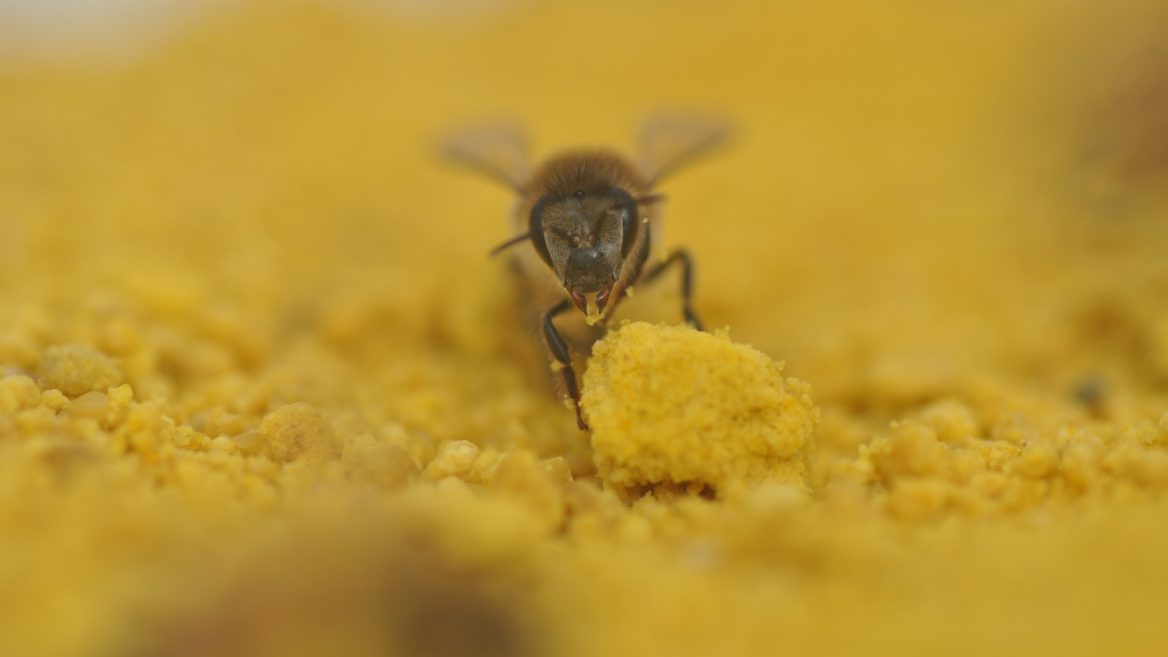 Unique Israeli research reveals why honeybees are dying
Unique Israeli research reveals why honeybees are dying
Abigail Klein Leichman
 A bee in the Benjamin Triwaks Bee Research Center in Rehovot. Photo by Shlomi Zarchin
A bee in the Benjamin Triwaks Bee Research Center in Rehovot. Photo by Shlomi Zarchin
If you give a “menu” to a bee, it will instinctively choose dishes that provide the right balance of nutrients: sugary nectar plus pollen full of protein, fatty acids and micronutrients.
That’s one of the findings of groundbreaking experiments performed at Israel’s Benjamin Triwaks Bee Research Center at Hebrew University’s Robert H. Smith Faculty of Agriculture in Rehovot.
The center also has discovered that, like humans, bees consuming an unhealthy ratio of omega-6 to omega-3 fatty acids develop cognitive deficiencies.
They cannot simply choose pollen from flowers high in omega-3 because increasing urbanization has decimated many kinds of wildflowers. The resulting nutritional imbalance is a major reason why honeybees, responsible for the pollination of more than 90 commercial food crops across the world, are dying at an alarming rate.
“Our specific research is on understanding bee diets and how they choose their diets. We know they need nectar and pollen, and that all comes from flowers,” Bee Research Center director Prof. Sharoni Shafir tells ISRAEL21c.
“Beekeepers can give them sugar water if there’s not enough nectar but lack of pollen is a more acute problem because it’s complex. There are essential amino acids they can only get from pollen, and the amount of essential fatty acids — omega-3 and omega-6 – varies from pollen to pollen. We are working in an international consortium to understand how to formulate an artificial diet that will be as good as pollen,” he says.
 Prof. Sharoni Shafir, second from left, with staff and researchers at the Benjamin Triwaks Bee Research Center of Hebrew University. Photo: courtesy
Prof. Sharoni Shafir, second from left, with staff and researchers at the Benjamin Triwaks Bee Research Center of Hebrew University. Photo: courtesy
Omega-3 deficiency slows bees’ learning
Shafir’s PhD student Yael Arien fed colonies of bees with artificial pollens, some poor in omega-3 and others rich in omega-3. Then she tested the bees’ learning aptitude using Pavlovian conditioning.
The experiment revealed that 90% of the bees raised on high omega-3 diets learned to differentiate between odors associated with sugar or salt within three trials. But only about 45% of the bees raised on an omega-3 deficient diet were able to do so.
“That was a striking effect,” says Shafir.
He explains that in humans, the right balance of omega-6 and omega-3 is 1:1. The typical modern Western diet (high in corn and corn byproducts and low in fish and free-range meat, poultry and eggs) provides a 15:1 omega-6 to omega-3 ratio. This imbalance is thought to contribute to cognitive dysfunctions such as dementia, depression and ADHD.
“Some doctors think too much omega-6 is the No. 1 health issue of the future,” Shafir says. “In bees and other invertebrates, nobody has looked at this possible unbalance. It turns out that bees usually collect pollen higher in omega-3 than omega-6. When they can, they collect a mixed diet of pollen.”
 A honeybee feeding on a high-pollen Leucophyllum (San Jose) shrub. Photo by Pablo Chercasky/KKL-JNF
A honeybee feeding on a high-pollen Leucophyllum (San Jose) shrub. Photo by Pablo Chercasky/KKL-JNF
read more: Israeli research …. why honeybees are dying
twoje uwagi, linki, wlasne artykuly, lub wiadomosci przeslij do: webmaster@reunion68.com
